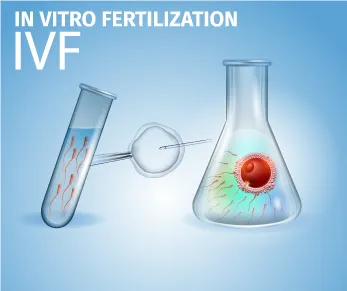Being an effective assisted reproductive technology (ART), the in vitro fertilization or IVF procedure helps couples, with fertility problems, become pregnant or conceived. The process involves using either the woman partner’s own eggs and the man partner’s sperm, or the eggs or sperm or embryos from a donor, who may be known or anonymous.
Though IVF is considered to be the most effective fertility treatment, its chances of successful pregnancy rates depend on several factors such as the advanced maternal age (AMA) of the woman partner and causes of infertility. IVF is a complex procedure and doctors suggest it as a primary treatment for couples who have ovulation disorders, uterine fibroids, blocked fallopian tube, endometriosis, unexplained fertility, genetic orders and impaired sperm production.
IVF may pose certain risks such as miscarriage, multiple births, premature delivery, ectopic pregnancy and ovarian hyperstimulation syndrome. Most fertility centers perform different screening tests for their success rate depends on factors such as the intended couples’ age and medical issues and their treatment approaches.
Common Screening Tests
-
Semen Analysis
With a sperm count test, the health, as well as viability of the sperm is analysed through factors such as the count, shape and motility of the sperm. Before performing the IVF procedure, your doctor will conduct a few separate sperm analyses to ensure the sperm’s health. Nevertheless, these tests are conducted over a span of two or three months, with each sperm analyses having a gap of at least seven days between them. You receive a conclusive result on the average of the sperm samples taken.
-
Ovarian Reserve Testing
“Ovarian reserve” means the existing egg supply in a woman, which can give birth to babies. The quantity and quality of eggs in the ovaries, and the ovarian follicles’ response to the brain’s hormonal signals show a woman’s fertility. The ovarian reserve is the most significant factor considered to check a woman’s pregnancy potential in case other fertility factors are unavailable. Hormonal level tests are the best indicators to know whether ovulation is occurring or not. Some tests conducted to determine the ovarian reserve are follicle-stimulating hormone (FSH), anti-Müllerian hormone, estradiol (estrogen), and an ovarian antral follicle count.
Hormone levels are the outward signs of ovulation. Several tests that check for normal ovulation rely on measuring these hormones. The main tests for ovarian reserve are follicle-stimulating hormone (FSH), estradiol, anti-Müllerian hormone and antral follicle count. The doctor will perform these tests usually on the day 2 or 3 of the menstrual cycle.
-
Infectious Diseases Screening
When preparing for pregnancy through the assisted conception treatment, it is a common practice of a fertility clinic and specialists to ask the couples or donors to undergo virology screening for Hepatitis B, Hepatitis C, Syphilis and HIV 1 and 2. These diseases can cause serious complications during pregnancy.
-
Uterine Cavity Examination
Among several reasons, uterine cavity abnormalities may lead to subfertility or continual implantation failure. Prior to the IVF treatment, the uterine cavity assessment is recommended by your doctor. Using transvaginal ultrasound scan, the endometrial lining, as well as the cavity, is examined. The use of saline hysterosonography further helps to evaluate the abnormal uterine findings. This highly sensitive scan helps specifically identify intrauterine abnormalities. The lighter version of the scan is hysteroscopy, where a flexible lighted telescope is guided through the vagina into the uterus to examine any abnormalities.
Also Read: Pros & Cons Of IVF
-
Tubal Patency Test
Patent fallopian tubes help become pregnant, and if your fallopian tubes are blocked or occluded, it results in infertility. The causes for tubal occlusion may be previous appendicitis, severe endometriosis, earlier pelvic infection and pelvic adhesions. With the tubal patency test or HyCoSy, integrated assessment of the uterus, fallopian tubes and endometrial cavity is conducted. A simple procedure, HyCoSy takes just 30 minutes, where a vaginal speculum, as well as a flexible balloon catheter, is inserted to examine the cervix for any uterine pathology.
-
Prolactin and Thyroid Hormones
Prolactin is produced by the pituitary gland, and is a protein hormone of multiple talent. In pregnant women, it controls the production of breast milk. It is essential to check the prolactin levels for fertility in women. Prior to the IVF treatment, your doctor will ensure whether the prolactin and thyroid hormone levels are normal. If they are abnormal, they need to be corrected to avoid any complications.
-
Mock Embryo Transfer
Most fertility clinics do mock embryo transfer procedure before the IVF cycle. This helps your doctor to perfect the IVF technique before going for the actual IVF transfer. With the trial run, the fertility specialist can find the best “route” to place the embryo at an ideal place in the uterus. This helps your doctor know whether the transfer is difficult and how to manipulate it.
Also, Read: Five Advantages of Invitrofertilization
